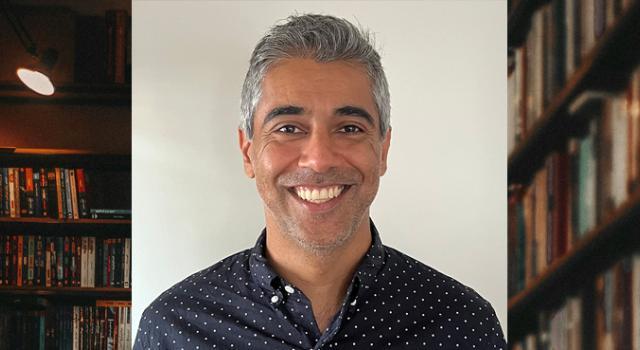
Gaurav Jashnani

Gaurav Jashnani is a scholar, educator, and organizer working at the nexus of psychology, Black studies, and critical university studies. They hold a master's in counseling from Columbia University and a doctorate in psychology from the City University of New York (CUNY) Graduate Center, with certificates in Africana studies and American studies. Prior to working at Hampshire, they were a postdoctoral fellow at CUNY's Institute for Research on the African Diaspora in the Americas and the Caribbean.
Jashnani's work on institutionalized racism, social change, and embodied experiences of harm and healing has been funded by the Tides Foundation, American Educational Research Association, U.S. Fulbright Program, Roothbert Fund, and Society for the Psychological Study of Social Issues, and has been published in psychology, criminology, and education journals as well as popular venues.
He has been fortunate to work or partner in the past with Critical Resistance, Creative Interventions, generation FIVE, Generative Somatics, Global Action Project, and Communities United for Police Reform. Jashnani is also a licensed psychotherapist and co-founder of the www.challengingmalesupremacy.org.
Recent and Upcoming Courses
-
This course introduces the role of political and sociocultural factors in appropriate, effective and ethical counseling, and in mental health more broadly. This is a theoretical, practical and experiential course that will focus on expanding awareness of your own values and biases; developing critical thinking and awareness of differing experiences and worldviews; and increasing your sensitivity to how sociocultural identities influence prospective clients and others. The focus of the course is on people as social beings with a range of intersecting identities that can deeply shape their mental health and prospective therapeutic relationships. The course concentrates on factors such as race, gender, class, sexual identity, religion, and (dis)ability, and engages with topics like institutional violence, discrimination, power, oppression, and socialization. Students will produce an autobiographical term-paper scaffolded throughout the semester, as well as a final project and smaller weekly assignments. Keywords:Race, gender, power, psychology, mental health
-
What motivates students of color to challenge and rebel against their institutions? This course explores student racial justice organizing in US colleges and universities, with a focus on several recent movements (e.g., Black Lives Matter, Palestinian solidarity) as well as earlier foundational ones. While examining specific movements, we will also seek to understand the experience of student protest and some of the broader historical dynamics of these movements in the US. Students will not only learn about key movements but also complete independent research on protest movements beyond our primary focus, and will share their findings in succinct, in-class presentations Keywords:Race, activism, Palestine, Black Lives Matter, student organizing
-
This course introduces the role of political and sociocultural factors in appropriate, effective and ethical counseling, and in mental health more broadly. This is a theoretical, practical and experiential course that will focus on expanding awareness of your own values and biases; developing critical thinking and awareness of differing experiences and worldviews; and increasing your sensitivity to how sociocultural identities influence prospective clients and others. The focus of the course is on people as social beings with a range of intersecting identities that can deeply shape their mental health and prospective therapeutic relationships. The course concentrates on factors such as race, gender, class, sexual identity, religion, and (dis)ability, and engages with topics like institutional violence, discrimination, power, oppression, and socialization. Students will produce an autobiographical term-paper scaffolded throughout the semester, as well as a final project and smaller weekly assignments. Keywords:Race, gender, power, psychology, mental health
-
Officially, autism is a psychological and neurodevelopmental diagnosis as well as a disability. It is also a life experience, identity, and-for some-a source of power and point of pride, as part of a broader neurodivergence movement. In this discussion-centered course, we will read work about autism primarily by autistic writers (and illustrators) and will spend much of the course planning and carrying out scholarly and creative projects related to autism and/or other aspects of neurodiversity. Students are expected to enter the course with concrete ideas for their desired project, as well as familiarity and experience with autism and/or other aspects of neurodiversity. Personal, lived experience of neurodiversity is very much welcome and encouraged. Students across a range of disciplinary interests, including the arts (e.g., film, animation, graphic novels, music), are welcome. Please fill out the instructor permission form if interested: https://forms.gle/SQSZoAYKXV1dTAYU7 Keywords:Autism, autistic, neurodiversity, neurodivergence, disability
-
This course introduces the role of political and sociocultural factors in appropriate, effective and ethical counseling, and in mental health more broadly. This is a theoretical, practical and experiential course that will focus on expanding awareness of your own values and biases; developing critical thinking and awareness of differing experiences and worldviews; and increasing your sensitivity to how sociocultural identities influence prospective clients and others. The focus of the course is on people as social beings with a range of intersecting identities that can deeply shape their mental health and prospective therapeutic relationships. The course concentrates on factors such as race, gender, class, sexual identity, religion, and (dis)ability, and engages with topics like institutional violence, discrimination, power, oppression, and socialization. Students will produce an autobiographical term-paper scaffolded throughout the semester, as well as a final project and smaller weekly assignments Keywords:Race, gender, power, counseling, mental health
-
What motivates students to challenge and rebel against their institutions? This course explores student organizing in US colleges and universities, with a focus on several recent movements (e.g., Black Lives Matter, Palestinian solidarity) as well as earlier foundational ones. While examining specific movements, we will also seek to understand the experience of student protest and some of the broader historical dynamics of these movements in the US. Students will aim to interview participants in recent movements, particularly the Palestinian solidarity movement, in order to collect the beginnings of an oral history archive. In addition, students will complete independent research on protest movements beyond our primary focus and share their findings in succinct, in-class presentations Keywords:Race, activism, Palestine, Black Lives Matter, student organizing


